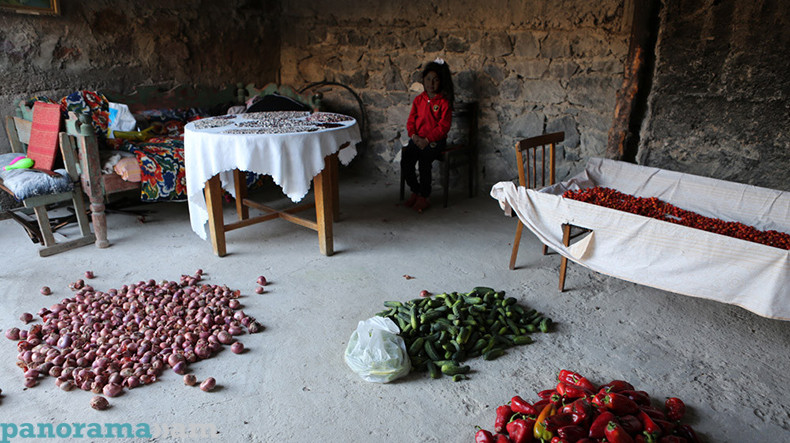
Food security expert: We pay the cost for hunger due to incompetent management
Every Sunday starting from 2013 “Helping poor families” https://web.facebook.com/ognenqkariqavornerin/?fref=ts&_rdr Facebook initiative group members visit the families in need, providing food, personal hygiene, fuel, toys and money to them.
“There were cases when children rushed to the food without paying attention to the toys. Those scenes are in front of my eyes, they were just hungry,” Sona Manukyan, the founder of the initiative group, who is also known as Sona Roberts, told Panorama.am. To her, after every such visit she thought that was the last case, however, the next family appeared to be even in more desperate need.
“Outside Yerevan, in the regions, the situation is awful with many people in hopeless situation,” Sona described her experience.
Pediatrician Armine Sakanyan, coordinator at Maternity and Child health service indicates to the increasing number of children suffering from malnutrition as witnessed over the course of 38 years of her professional activity. In 2011-2012 she initiated a comparative study of children’s weight and growth
“We put together the data of all 150 children under 1 year registered in Stepanavan policlinic and compared those data, which revealed that the problem in 15-20 children is related to their weight,” Sakanyan said.
To the specialist’s words at that age the issues of nutrition are mainly conditioned by a low awareness of their mothers and the adopted wrong methods. The monitoring helped them to raise the issues and address them.
In adulthood, not the mothers’ low awareness should be blamed for malnutrition in children. To her words, the number of poor families and the polarization in the society have significantly grown as compared with the Soviet times.
Davit Pipoyan, expert in food security explained that appropriate nutrition is not only about daily calories but also taking necessary amount of vitamins, food ingredient, micro and macro components.
“If you eat only bread and take the necessary calories, it does not secure you form underdevelopment,” Pipoyan told Panorama.am
Pascale Micheau, World Food Program Country Director and Representative in Armenia, once reflected on a report by the Government of Armenia and UN agencies http://www.panorama.am/en/news/2016/03/23/Report/1549901 stated that the hunger has many costs.
She explained that malnutrition in children negatively affects the state GDP due to the growth in health expenses and low productivity. It also increases the educational expenses.
Davit Pipoyan noted: “We paying those costs due to incompetent management”
To the expert’s words, in Armenia malnutrition is explained by the absence of agrarian policy, namely food security and food safety.
“These concepts are inextricably interlinked. Well-being for animals and plants is conditions with access and safety to food. If you have poor management, foot-and-mouth disease bring severe implications for animal farming, birds die from bird flu, pigs - from swine fever, which means we record a decline in food,” the expert said.
With this regards, Pipoyan singled out the European experience after the World War II when in a situation of all around hunger the primary agricultural policy was fixed in the Constitution, adopting a targeted policy to pressing issues.
Reflecting on the situation in Armenia, Pipoyan said it is unacceptable to develop simultaneously mining industry and the agriculture. The next important factor outlined by Pipoyan is the application of agricultural expansions through innovative methods. The expert does not downgrade the role of small and medium size farmers’ groups, yet he sees the application of expansion as pledge to decrease in operation costs and rise in productivity.
“Let us take the example of the fishery, where we wastelessly used the underground waters of Ararat valley, while in abroad, particularly in Denmark, water circulation systems based on closed cycles is used which allows to enrich it with oxygen and increase the productivity levels using the same quantity of the waters. I do not even speak of drip irrigation systems, etc.,” Pipoyan said.
In addressing malnutrition, Pipoyan also pays attention to the formation of the real price, suggesting a low price as a guiding policy is quite ineffective in the agricultural sphere, since it creates unfavorable conditions for the small and medium sized farmers.
Pipoyan emphasized with regret that no steps have been undertaken to improve the situation. The apricot is thrown away, while it is possible to organize the dried apricot production, instill refrigerator technologies.
To the expert’s words agricultural works become unprofitable and the villagers turn into migrants amid an absence of a state program.
“In Europe there is an adopted policy that if the local producers have the capability to produce something, the import is banned, since that hinders sustainable land development. The latter is pregnant with unwanted consequences, like the ones we witness in Armenia - increase in the number of children suffering from malnutrition. That is an issue of national security,” said Pipoyan.
The expert wonders over the fact that most of the malnutrition cases is recorded in villages, while those are the places where food is produced.
He suggests involving the villagers in agricultural works, which will contribute to the sustainable development of a state and food safety. Pipoyan outlines three factors to start with – legal acts, financing means and a timetable.
“The agrarian right is one of the unique spheres, where amateurs may bring nothing, while the professionalism and the best international experience may generate a result,” he said.
Ahead of the World Food Day to be marked on October 16 assistant to Representative of UN Food and Agriculture Organization (FAO) in Armenia Gayane Nasoyan said “ The agriculture and food production systems should be changed to have zero hungry generation, which implies wiser use of the natural resources, more harvesting from the same portion of a land, decrease in food loss and promoting the diversity in livelihoods”.
Newsfeed
Videos






























